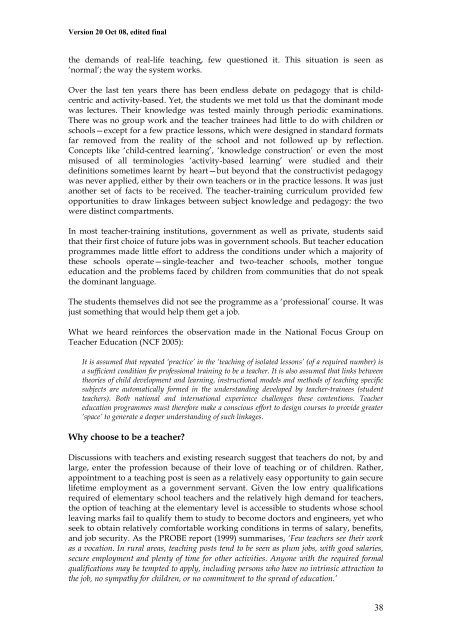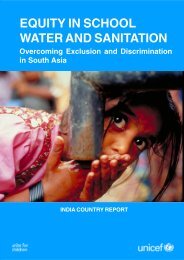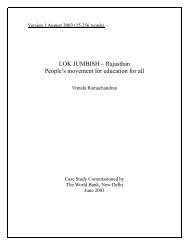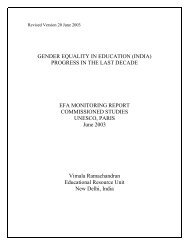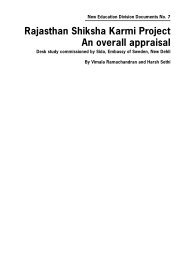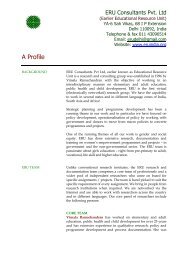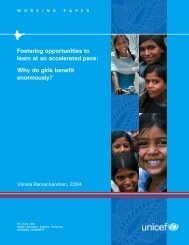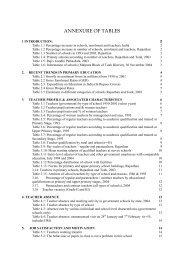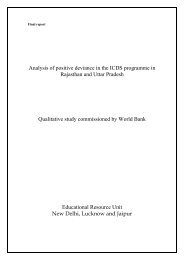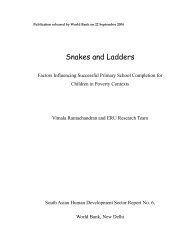primary school teachers the twists and turns of everyday practice
primary school teachers the twists and turns of everyday practice
primary school teachers the twists and turns of everyday practice
Create successful ePaper yourself
Turn your PDF publications into a flip-book with our unique Google optimized e-Paper software.
Version 20 Oct 08, edited final<br />
<strong>the</strong> dem<strong>and</strong>s <strong>of</strong> real-life teaching, few questioned it. This situation is seen as<br />
‘normal’; <strong>the</strong> way <strong>the</strong> system works.<br />
Over <strong>the</strong> last ten years <strong>the</strong>re has been endless debate on pedagogy that is childcentric<br />
<strong>and</strong> activity-based. Yet, <strong>the</strong> students we met told us that <strong>the</strong> dominant mode<br />
was lectures. Their knowledge was tested mainly through periodic examinations.<br />
There was no group work <strong>and</strong> <strong>the</strong> teacher trainees had little to do with children or<br />
<strong>school</strong>s—except for a few <strong>practice</strong> lessons, which were designed in st<strong>and</strong>ard formats<br />
far removed from <strong>the</strong> reality <strong>of</strong> <strong>the</strong> <strong>school</strong> <strong>and</strong> not followed up by reflection.<br />
Concepts like ‘child-centred learning’, ‘knowledge construction’ or even <strong>the</strong> most<br />
misused <strong>of</strong> all terminologies ‘activity-based learning’ were studied <strong>and</strong> <strong>the</strong>ir<br />
definitions sometimes learnt by heart—but beyond that <strong>the</strong> constructivist pedagogy<br />
was never applied, ei<strong>the</strong>r by <strong>the</strong>ir own <strong>teachers</strong> or in <strong>the</strong> <strong>practice</strong> lessons. It was just<br />
ano<strong>the</strong>r set <strong>of</strong> facts to be received. The teacher-training curriculum provided few<br />
opportunities to draw linkages between subject knowledge <strong>and</strong> pedagogy: <strong>the</strong> two<br />
were distinct compartments.<br />
In most teacher-training institutions, government as well as private, students said<br />
that <strong>the</strong>ir first choice <strong>of</strong> future jobs was in government <strong>school</strong>s. But teacher education<br />
programmes made little effort to address <strong>the</strong> conditions under which a majority <strong>of</strong><br />
<strong>the</strong>se <strong>school</strong>s operate—single-teacher <strong>and</strong> two-teacher <strong>school</strong>s, mo<strong>the</strong>r tongue<br />
education <strong>and</strong> <strong>the</strong> problems faced by children from communities that do not speak<br />
<strong>the</strong> dominant language.<br />
The students <strong>the</strong>mselves did not see <strong>the</strong> programme as a ‘pr<strong>of</strong>essional’ course. It was<br />
just something that would help <strong>the</strong>m get a job.<br />
What we heard reinforces <strong>the</strong> observation made in <strong>the</strong> National Focus Group on<br />
Teacher Education (NCF 2005):<br />
It is assumed that repeated ‘<strong>practice</strong>’ in <strong>the</strong> ‘teaching <strong>of</strong> isolated lessons’ (<strong>of</strong> a required number) is<br />
a sufficient condition for pr<strong>of</strong>essional training to be a teacher. It is also assumed that links between<br />
<strong>the</strong>ories <strong>of</strong> child development <strong>and</strong> learning, instructional models <strong>and</strong> methods <strong>of</strong> teaching specific<br />
subjects are automatically formed in <strong>the</strong> underst<strong>and</strong>ing developed by teacher-trainees (student<br />
<strong>teachers</strong>). Both national <strong>and</strong> international experience challenges <strong>the</strong>se contentions. Teacher<br />
education programmes must <strong>the</strong>refore make a conscious effort to design courses to provide greater<br />
‘space’ to generate a deeper underst<strong>and</strong>ing <strong>of</strong> such linkages.<br />
Why choose to be a teacher?<br />
Discussions with <strong>teachers</strong> <strong>and</strong> existing research suggest that <strong>teachers</strong> do not, by <strong>and</strong><br />
large, enter <strong>the</strong> pr<strong>of</strong>ession because <strong>of</strong> <strong>the</strong>ir love <strong>of</strong> teaching or <strong>of</strong> children. Ra<strong>the</strong>r,<br />
appointment to a teaching post is seen as a relatively easy opportunity to gain secure<br />
lifetime employment as a government servant. Given <strong>the</strong> low entry qualifications<br />
required <strong>of</strong> elementary <strong>school</strong> <strong>teachers</strong> <strong>and</strong> <strong>the</strong> relatively high dem<strong>and</strong> for <strong>teachers</strong>,<br />
<strong>the</strong> option <strong>of</strong> teaching at <strong>the</strong> elementary level is accessible to students whose <strong>school</strong><br />
leaving marks fail to qualify <strong>the</strong>m to study to become doctors <strong>and</strong> engineers, yet who<br />
seek to obtain relatively comfortable working conditions in terms <strong>of</strong> salary, benefits,<br />
<strong>and</strong> job security. As <strong>the</strong> PROBE report (1999) summarises, ‘Few <strong>teachers</strong> see <strong>the</strong>ir work<br />
as a vocation. In rural areas, teaching posts tend to be seen as plum jobs, with good salaries,<br />
secure employment <strong>and</strong> plenty <strong>of</strong> time for o<strong>the</strong>r activities. Anyone with <strong>the</strong> required formal<br />
qualifications may be tempted to apply, including persons who have no intrinsic attraction to<br />
<strong>the</strong> job, no sympathy for children, or no commitment to <strong>the</strong> spread <strong>of</strong> education.’<br />
38


